Herodotus, bk 8, logos 23
Herodotus of Halicarnassus (c.480-c.429 BCE): Greek researcher, often called the world's first historian. In The Histories, he describes the expansion of the Achaemenid Empire under its kings Cyrus the Great, Cambyses, and Darius I the Great, culminating in Xerxes' expedition to Greece (480 BCE), which met with disaster in the naval engagement at Salamis and the battles at Plataea and Mycale. Herodotus' book also contains ethnographic descriptions of the peoples that the Persians have conquered, fairy tales, gossip, and legends.
The naval battle of Artemisium (8.1-39)
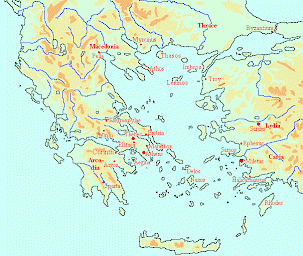
Book Seven of Herodotus' Histories ended with a Greek defeat, but in Book Eight we will hear about Greek successes. In its first logos, we witness the naval engagement on the sea between Aphetae and Artemisium. The Greek commander was the admiral of the small Spartan squadron, a man named Eurybiades. However, the Athenians had manned 127 ships and had given 20 ships to the Chalcidians; it was natural that the real commander was Themistocles, the man who had been responsible for the Athenian shipbuilding program (above and above). When the Persian fleet arrives at the opposite shore, Eurybiades wants to retreat; but Themistocles - who wants to counter the Persian offensive before it reaches Athens - bribes him to stay.
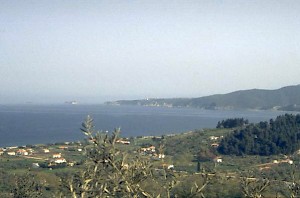
During the night, a diver named Scyllias defects to the Greeks, swimming all the way underwater (perhaps using a snorkel). He tells their admirals of the Persian losses at Squid's Cape. He also informs them of a squadron of two hundred Persian warships sailing around the island Euboea, which will attack the Greek rear. Eurybiades and Themistocles know that their 271 ships now face 600 Persian damaged ships, which are waiting passively until the two hundred ships have made their way around Euboea. Next day, the Greeks wait till the end of the afternoon, and then suddenly attack the other navy, with the intention of testing Persian seamanship and tactics. The enemies are caught off guard, and thirty ships are captured. After sunset, a Ionian captain defects to the Greeks, and immediately afterwards, there is a violent rainstorm. For the Persians at Aphetae, it is a bad night, but for the squadron sailing around Euboea it is a disaster: the ships are smashed against the rocks and many sailors drown in the sea, which is known as the 'hollows' of Euboea.
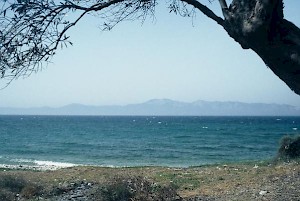
During the next day, the Greeks receive reinforcements: 53 warships from Athens, bringing the strength of the Athenian contingent to 200. Immediately, the Greeks attack their opponents, destroying the vessels of the Cilician contingent in the Persian navy and returning to Artemisium at sunset.
On the third day, it is the Persian's turn to take the initiative: the two fleets are evenly matched. When the sun sets, both fleets return to their moorings; the Greeks manage to recover and bury the floating bodies. They have suffered severe losses (e.g., half the Athenian ships are damaged) and decide to retreat.
On the first day after the battles at Thermopylae and Artemisium, Xerxes' marines visit the place where Leonidas is defeated. Although Xerxes tries to conceal the number of his own dead, nobody is deceived. From a Greek deserter, the Persians learn that the Greeks are now celebrating the Olympic Games. The fact that the first prize is just a wreath of olive leaves shocks Xerxes' courtiers, and one remarks: 'Good heavens, Mardonius, what kind of men are these that you have brought us to fight against - men who compete with one another for no material reward, but only for honor!'
The Persians continue their march; soon, they reach Thebes, which has already offered earth and water. This logos ends with a short description of Persian raid on Delphi. It comes to nothing, because when the Persians reach the temple of Athena Pronaia, the Greeks receive divine aid in the form of an avalange.
Comment
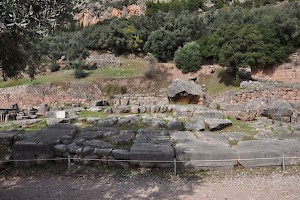
Herodotus' fame as a historian does not rest on his knowledge of military affairs. He writes that it was 'coincidence that the battles at sea took place on the same days as the battles at Thermopylae'. In fact, the engagements were interrelated. The Greek strategy was to destroy the Persian navy; in doing so, they could force Xerxes to reduce the numbers of his army (cf. above). Only then, the Greek army would have a fair chance to drive away the invaders. Leonidas was to hold up the great king's army with his small force, and the navy was to do the real job. (Go here for the diary of Xerxes' campaign.)
The Persians understood that the Greek navy was the real enemy; their goal in this double battle was to destroy the Greek navy. To reach this goal, they sent the two hundred warships around Euboea: not to attack the Greek navy in its rear (as Herodotus believes) but to attack the Greek army at Thermopylae. When Leonidas would have been defeated, the two hundred ships would ferry the Persian army to Euboea, where the army could attack the Greek naval base at Artemisium. As we have seen, this plan failed because the fleet was annihilated in a storm. Even worse, the Athenians could send the 53 vessels that were guarding the east coast of Euboea and Attica to Artemisium.
On the first two days, the Greek tactic was to descend in a concentrated attack on just one squadron of the large Persian navy (e.g., the Cilician ships on the second day). This kind of hit-and-run-tactic was possible because their enemy's fleet was so large that it harbored on several places at some distance of each other. When the Persian supreme command learned of a Greek attack, the enemy had already retreated.
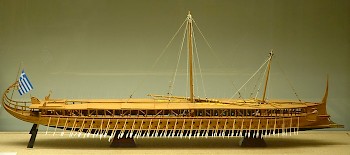
On the third day, however, the Greeks were defeated, a fact which Herodotus cannot really obscure. But even if the Greeks were not defeated, they were forced to retreat from Artemisium, because Thermopylae had fallen: from now on, the position of the Greek navy was precarious, because it had no longer any cover in the rear.
Herodotus is mistaken about the date of the Olympic Games. It is extremely difficult to date the events of the Summer of 480, but all reconstructions by modern scholars assume that the Games ended shortly before or - most probably - during the two battles (September 18).
It is unlikely that the Persians ever attacked Delphi. Herodotus' story cannot be believed: for example, he quotes Persian witnesses of the avalange, which suggests thorough investigation, but at the same time, he is unable to mention the name of the Persian commander (probably Megabyzus). Moreover, the Persians venerated Apollo (they considered him identical to their own supreme god Ahuramazda) and would never have destroyed one of his temples. It is more probable that the expedition to Delphi had no other objective than to worship the god who had helped their expedition so far by giving discouraging oracles to the Greeks (above).